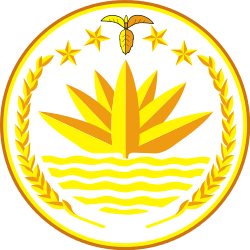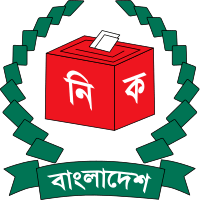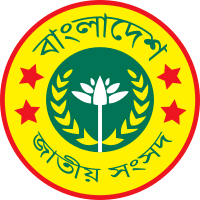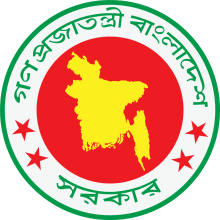Democracy in Bangladesh
 |
|---|
| This article is part of a series on the politics and government of Bangladesh |
|
Constitution and law |
|
|
 |
Democracy is one of the four fundamental principles according to the original 1972 Constitution of Bangladesh.[1]
History
Democracy was introduced in the region through the arrival of the British Raj. The democracy that was introduced was based on the Westminster style system practiced in United Kingdom.[2] After the Independence of Bangladesh in 1971, the constitution was formed in 1972. The constitution had four fundamental principle, which were democracy, nationalism, secularism, and socialism.[1] On 7 June 1975, the president of Bangladesh Sheikh Mujibur Rahman established a one party state called Bangladesh Krishak Sramik Awami League.[3] On 15 August 1975 he was overthrown in a military coup.[4] On 6 December 1990 General Hussain Mohammad Ershad resigned from his office and restoring democracy in Bangladesh.[5]
References
- 1 2 Casanova, José; Cesari, Jocelyne. Islam, Gender, and Democracy in Comparative Perspective. Oxford University Press. p. 143. ISBN 9780198788553.
- ↑ "Bangladesh and its confusion on democracy". bdnews24.com. 23 May 2015. Retrieved 4 May 2017.
- ↑ Islam, Sirajul. "Bangladesh Krishak Sramik Awami League". en.banglapedia.org. Banglapedia. Retrieved 5 May 2017.
- ↑ "Hasina asks next generation to know history". Prothom Alo. Retrieved 5 May 2017.
- ↑ "The Rocky Road of Democracy". The Daily Star. 6 December 2016. Retrieved 5 May 2017.


